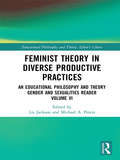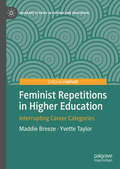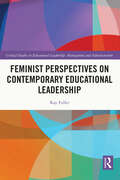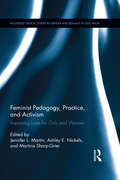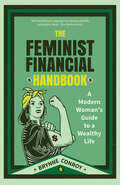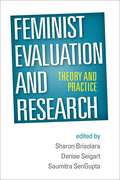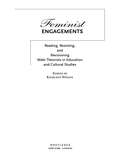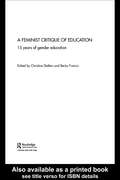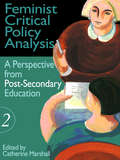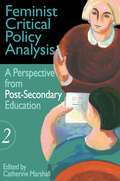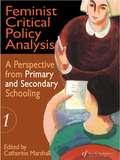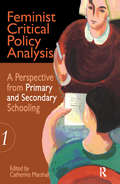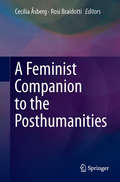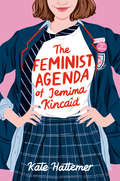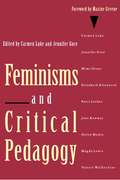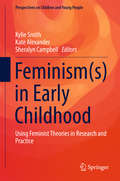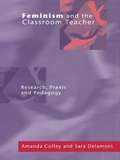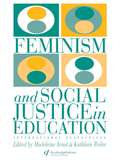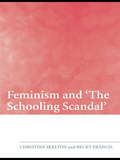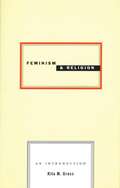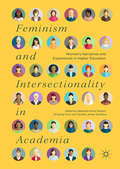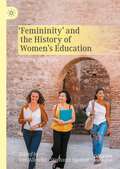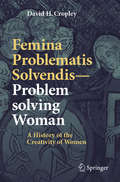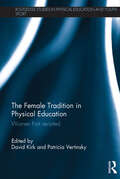- Table View
- List View
Feminist Theory in Diverse Productive Practices: An Educational Philosophy and Theory Gender and Sexualities Reader, Volume VI (Educational Philosophy and Theory: Editor’s Choice)
by Liz Jackson Michael A. PetersFeminist Theory in Diverse Productive Practices is the second of two volumes examining gender and feminist theory in Educational Philosophy and Theory. This collection explores the difference that gender and sexual identities make both to theorizing and working in education and other fields. As the articles contained in this text span nearly 40 years of scholarship related to these issues, this volume sheds light on how feminist, gender, and sexuality theory has evolved within and beyond the field of philosophy of education over time. Key themes explored in the book include women’s ways of knowing, the challenges women (and girls) face in taking up professional employment across diverse fields historically and today, and how feminist and related theories can enable women in professional development roles to empower each other. The book tells a rich story of how gender and sexuality theory has been brought to bear on discussions of educational practice in diverse fields over decades of publication of Educational Philosophy and Theory. Feminist Theory in Diverse Productive Practices will be key reading for academics, researchers and postgraduate students in the fields of philosophy of education, philosophy, education, educational theory, post-structural theory, and the policy and politics of education.
Feminist Repetitions in Higher Education: Interrupting Career Categories (Palgrave Studies in Gender and Education)
by Maddie Breeze Yvette TaylorTo do feminism and to be a feminist in higher education is to repeat oneself: to insist on gender equality as more than institutional incorporation and diversity auditing, to insert oneself into and against neoliberal measures, and to argue for nuanced intersectional feminist analysis and action. This book returns to established feminist strategies for taking up academic space, re-thinking how feminists inhabit the university and pushing back against institutional failures. The authors assert the academic career course as fundamental to understanding how feminist educational journeys, collaborations and cares and ways of knowing stretch across and reconstitute academic hierarchies, collectivising and politicising feminist career successes and failures. By prioritising interruptions, the book navigates through feminist methods of researcher reflexivity, autoethnography and collective biography: in doing so, moving from feminist identity to feminist practice and repeating the potential of queer feminist interruptions to the university and ourselves.
Feminist Popular Education in Transnational Debates
by Linzi Manicom Shirley WaltersThis book is a collection of grounded accounts by feminist popular educators and reflects critically on processes of collective learning and self- and social transformation in various geopolitical settings. Engaging contemporary feminist political issues and theory, contributors explore emerging pedagogical practices.
Feminist Perspectives on Contemporary Educational Leadership (Critical Studies in Educational Leadership, Management and Administration)
by Kay FullerThis timely book explores how various feminist perspectives fruitfully explain women’s experience of educational leadership, drawing on a contemporary conceptualisation of fourth-wave feminism that is intersectional and inclusive. The book asks which and whose feminist theory is used to explain gender and feminism in educational leadership, management and administration (ELMA): the scholar’s, the research participant’s or a combination of the two in the co-construction of knowledge from an intersectional feminist perspective. It conceptualises intersectional and inclusive feminist perspectives on educational leadership, theorising research through a Black British feminist perspective, a gender and Islamic perspective and a queer theory perspective, depending on the self-identification of participants. It explores digital feminism and men’s pro-feminism. The book identifies feminist leadership praxis as a focus for future research and explores how leaders can draw on funds of knowledge, identity cultural wealth and lead and educate diverse populations of students. Highlighting the importance of intersectional feminist perspectives in ELMA, the book will appeal to scholars, researchers and postgraduate students in the fields of inclusive educational leadership and management, gender studies and feminism.
Feminist Pedagogy, Practice, and Activism: Improving Lives for Girls and Women (Routledge Critical Studies in Gender and Sexuality in Education)
by Jennifer L. Martin Ashley E. Nickels Martina Sharp-GrierFeminist programming, no matter the venue, provides opportunities for young girls and women, as well as men, to acquire leadership skills and the confidence to create sustainable social change. Offering a wide-ranging overview of different types of feminist engagement, the chapters in this volume challenge readers to critically examine accepted cultural norms both in and out of schools, and speak out about oppression and privilege. To understand the various pathways to feminism and feminist identity development, this collection brings together scholars from education, women’s studies, sociology, and community development to examine ways in which to integrate feminism and women’s studies into education through pedagogy, practice, and activism.
The Feminist Financial Handbook: A Modern Woman's Guide to a Wealthy Life
by Brynne Conroy#1 New Release in Volunteer Work and Poverty — Your Guide to Wealth and SuccessLive your wealthiest life: Sometimes the best way to stick it to the man is by doing well for yourself. There’s just one problem: it’s hard to do well for yourself when systemic oppression has placed innumerable hurdles between you and your aspirations. The Feminist Financial Handbook provides real motivation and resources for real women who may be struggling—not only those who have already accumulated wealth.Overcome obstacles: The Feminist Financial Handbook provides actionable tips for women in business for overcoming these obstacles as they try to master money management and their lives. Because women’s experiences don’t exist in a vacuum relegated to their gender, the handbook explores financial issues with anecdotes and perspectives of women of different races, sexual orientations and abilities.Find the answers to your money questions: Learn more about general financial planning principles, like saving or earning a higher income, and delve into issues that disproportionately affect women, like the wage gap or the long road to economic recovery after experiencing domestic violence. The Feminist Financial Handbook has stories and advice from women who have been there, worked through the struggle, and achieved personal success.Learn from the frontrunner of the Femme Frugality blog: Written in the same passionate tone that has made Femme Frugality a two-time nominee for Best Women’s Finance Blog, The Feminist Financial Handbook acknowledges the financial struggles and oppression modern women face while providing actionable steps to live your wealthiest life and achieve personal success.The Feminist Financial Handbook presents a feminist view on finances relevant to a post-recession economy. This book will walk you through how to:Decide what wealth and success means for youEarn more and negotiate effectivelyMaster manageable money-saving methods
Feminist Evaluation and Research
by Saumitra Sengupta Denise Seigart Sharon BrisolaraThis thought-provoking book explores the 'whats,' 'whys,' and 'hows' of integrating feminist theory and methods into applied research and evaluation practice. Illustrative cases drawn from U.S. and international studies address a range of social and health issues. The book provides an overview of feminist theory and research strategies as well as detailed discussions of how to use a feminist lens, practical steps and challenges in implementation, and what feminist methods contribute to research and evaluation projects. Reflections at the close of each section invite the reader to consider key questions and common themes across the chapters. With a focus on social justice models, the book covers ways to conduct feminist research and evaluation in effective, innovative, and culturally competent ways in diverse social and cultural contexts.
Feminist Engagements: Reading, Resisting, and Revisioning Male Theorists in Education and Cultural Studies
by Kathleen WeilerFeminist Engagements is a collection of essays by some of the top names in feminist education, in which they read and revision the works of the major twentieth-century theorists in education and cultural studies.
Feminist Critique of Education: Fifteen Years of Gender Development (Education Heritage)
by Christine Skelton Becky FrancisThis book provides a valuable route map to the development of thinking in gender and education over the last fifteen years. It includes over thirty-five seminal articles from the journal Gender and Education, written by many of the leading authors in the field from the UK, the USA, Australia and Europe. Compiled by the current editors of the journal to show the development of the field, the book is divided into six sections: * Gender Identities * Theory and Method * Policy and Management * Sexuality * Ethnicity * Social Class. The specially written introduction by the editors contextualises the selection and introduces students to the main issues and current thinking in the field. Available in one easy-to-access place, this authoritative reference book provides a collection of articles that have lead the field. It should find a place in every library and on every departmental bookshelf.
Feminist Critical Policy Analysis II
by Catherine MarshallThis text sets out to challenge the traditional power basis of the policy decision makers in education. It contests that others who have an equal right to be consulted and have their opinions known have been silenced, declared irrelevant, postponed and otherwise ignored. Policies have thus been formed and implemented without even a cursory feminist critical glance. The chapters in this text illustrate how to incorporate critical and feminist lenses and thus create policies to meet the lived realities, the needs, aspirations and values of women and girls. A particular focus is the primary and secondary sectors of education.
Feminist Critical Policy Analysis II
by Catherine MarshallThis text sets out to challenge the traditional power basis of the policy decision makers in education. It contests that others who have an equal right to be consulted and have their opinions known have been silenced, declared irrelevant, postponed and otherwise ignored. Policies have thus been formed and implemented without even a cursory feminist critical glance. The chapters in this text illustrate how to incorporate critical and feminist lenses and thus create policies to meet the lived realities, the needs, aspirations and values of women and girls. A particular focus is the primary and secondary sectors of education.
Feminist Critical Policy Analysis I
by Catherine MarshallThis text sets out to challenge the traditional power basis of the policy decision makers in education. It contests that others who have an equal right to be consulted and have their opinions known have been silenced, declared irrelevant, postponed and otherwise ignored. Policies have thus been formed and implemented without even a cursory feminist critical glance. The chapters in this text illustrate how to incorporate critical and feminist lenses and thus create policies to meet the lived realities, the needs, aspirations and values of women and girls. A particular focus is the primary and secondary sectors of education.
Feminist Critical Policy Analysis I
by Catherine MarshallThis text sets out to challenge the traditional power basis of the policy decision makers in education. It contests that others who have an equal right to be consulted and have their opinions known have been silenced, declared irrelevant, postponed and otherwise ignored. Policies have thus been formed and implemented without even a cursory feminist critical glance. The chapters in this text illustrate how to incorporate critical and feminist lenses and thus create policies to meet the lived realities, the needs, aspirations and values of women and girls. A particular focus is the primary and secondary sectors of education.
A Feminist Companion to the Posthumanities
by Rosi Braidotti Cecilia ÅsbergThis companion is a cutting-edge primer to critical forms of the posthumanities and the feminist posthumanities, aimed at students and researchers who want to catch up with the recent theoretical developments in various fields in the humanities, such as new media studies, gender studies, cultural studies, science and technology studies, human animal studies, postcolonial critique, philosophy and environmental humanities. It contains a collection of nineteen new and original short chapters introducing influential concepts, ideas and approaches that have shaped and developed new materialism, inhuman theory, critical posthumanism, feminist materialism, and posthuman philosophy. A resource for students and teachers, this comprehensive volume brings together established international scholars and emerging theorists, for timely and astute definitions of a moving target – posthuman humanities and feminist posthumanities.
The Feminist Agenda of Jemima Kincaid
by Kate HattemerA novel about friendship, feminism, and the knotty complications of tradition and privilege, perfect for fans of Becky Albertalli and Stephanie Perkins.Jemima Kincaid is a feminist, and she thinks you should be one, too. Her private school is laden with problematic traditions, but the worst of all is prom. The guys have all the agency; the girls have to wait around for "promposals" (she's speaking heteronormatively because only the hetero kids even go). In Jemima's (very opinionated) opinion, it's positively medieval.Then Jemima is named to Senior Triumvirate, alongside superstar athlete Andy and popular, manicured Gennifer, and the three must organize prom. Inspired by her feminist ideals and her desire to make a mark on the school, Jemima proposes a new structure. They'll do a Last Chance Dance: every student privately submits a list of crushes to a website that pairs them with any mutual matches.Meanwhile, Jemima finds herself embroiled in a secret romance that she craves and hates all at once. Her best friend, Jiyoon, has found romance of her own, but Jemima starts to suspect something else has caused the sudden rift between them. And is the new prom system really enough to extinguish the school's raging dumpster fire of toxic masculinity?Filled with Kate Hattemer's signature banter, this is a fast-paced and thoughtful tale about the nostalgia of senior year, the muddle of modern relationships, and how to fight the patriarchy when you just might be part of the patriarchy yourself.
Feminisms and Critical Pedagogy
by Carmen Luke Jennifer GoreFirst Published in 1992. Routledge is an imprint of Taylor & Francis, an informa company.
Feminism(s) in Early Childhood
by Kylie Smith Kate Alexander Sheralyn CampbellThis unique book brings together international scholars from around the globe to examine how different feminist theories are being used in early childhood research, policy and pedagogy. The array of feminist discourses captured by the authors offer contextualised possibilities for disrupting dominant patriarchal beliefs and producing change. The authors address and challenge how early childhood experiences, institutions and practices produce gendered effects across and within diverse contexts and demonstrate how feminism(s) in action can be used to reconceptualise research methods, government policy, children's learning, teaching practice and educational resources. In this way, the book contributes to creating new knowledge connections and community alliances in the global effort to end gender-based inequalities across local and global communities.
Feminism and the Classroom Teacher: Research, Praxis, Pedagogy
by Amanda Coffey Sara DelamontHow has feminism influenced contemporary educational practices? Is feminism relevant to today's teachers? Feminism and the Classroom Teacher undertakes a feminist analysis of the work and everyday realities of the school teacher, providing evidence that feminism is still relevant as a way of thinking about the social work and as a lived reality. Providing a unique contribution to the literature in the area of gender and education, the authors' objective is to articulate the educational discourses of gender - how gender is constructed, performed and sustained through discourse and material practices. The overall aim of the book is to ascertain the extent to which women teachers specifically, and the feminist project more generally, have contributed to theoretical understandings and practical accomplishments of teaching.
Feminism And Social Justice In Education: International Perspectives
by Kathleen WeilerAfter more than twenty years of feminist education research, policy development and innovative school practice, it seems appropriate to evaluate the impact and significance of this world wide struggle for social justice in education. At the same time, the recent restructuring of educational provision whether in the name of sexual equality or the ideologies of the New Right also requires a considered response from Those Committed To Promoting Greater Social Equality.; This Collection offers a unique opportunity to host an international forum on contemporary thinking and practice, not just within different national contexts, but for feminism more generally. ln adopting a critical feminist approach, the chapters re-establish such egalitarian traditions as radical feminism, black feminism and socialist feminism and address such themes as the interrelation between social class, race and gender and the ways these articulate with feminist educational practice.; In gathering together leading educators from five different countries all committed to the project of social transformation, this book represents the shifting concerns of the feminist theoretical debate and helps formulate feminist educational agendas more suited to the political and economic conditions which orevail in the 19905.
Feminism and 'The Schooling Scandal'
by Christine Skelton Becky FrancisFeminism and ‘The Schooling Scandal’ brings together feminist contributions from two generations of educational researchers, evaluating and celebrating the field of gender and education. The focus throughout is on the years of compulsory schooling, examining key concepts in gender and education identified and developed by international thinkers in educational feminism. Topics covered include: social class, ethnicity and sexuality in relation to experiences in school; theories and methodologies for understanding gender; pedagogy and practice in education; and the direction of educational policy and the ‘problem of boys’. Providing a comprehensive overview of contemporary research and theory emerging from ‘second wave’ feminism and assessing their impact on pupils and teachers in today’s schools and classrooms, this book forms essential reading for anyone studying gender and education.
Feminism and Religion: An Introduction
by Rita M. GrossRita M. Gross offers an engaging survey of the changes feminism has wrought in religious ideas, beliefs, and practices around the world, as well as in the study and understanding of religion itself.
Feminism and Intersectionality in Academia: Women’s Narratives and Experiences in Higher Education
by Stephanie Anne Shelton Jill Ewing Flynn Tanetha Jamay GroslandThis edited volume explores the diversities and complexities of women’s experiences in higher education. Its emphasis on personal narratives provides a forum for topics not typically found in in print, such as mental illness, marital difficulties, and gender identity. The intersectional narratives afford typically disenfranchised women opportunities to share experiences in ways that de-center standard academic writing, while simultaneously making these stories accessible to a range of readers, both inside and outside higher education.
‘Femininity’ and the History of Women's Education: Shifting the Frame
by Tim Allender Stephanie SpencerThis book draws on recent deconstructions around the idea of ‘femininity’ as a social, racial and class construct and explores the diversity of spaces that may be defined as educational that range from institutional contexts to family, to professional outlooks, to racial identity, to defining community and religious groupings. It explores how notions of femininity change across time and place, and within individual lives. Such changes take place at the interface of external forces and individual agency. The application of the notion of ‘femininity’ that assumes a consistent definition of the term is interrogated by the authors, leading to a discussion of the rich possibilities for new directions in research into women’s lives across time, place, and individual life histories.
Femina Problematis Solvendis—Problem solving Woman: A History of the Creativity of Women
by David H. CropleyThis book explores the history of modern human creativity/innovation, highlighting examples of solutions to basic human’ needs that have been developed over time. The title – Femina Problematis Solvendis – is a play on the scientific classifications of humans (Homo habilis, Homo erectus, Homo sapiens), but with special focus on inventions pioneered by women (“femina”) and is intended to suggest that a defining characteristic of modern humans is our fundamental ability to solve problems (i.e., problem-solving woman = Femina problematis solvendis), Written by David H. Cropley, an internationally recognised expert on creativity and innovation, it also builds on his previous book “Homo Problematis Solvendis –Problem-solving Man”, published in 2019. The book explores innovations over ten distinct “ages” of human history, beginning with “prehistory”, and moving up to the present “information age”. Each era is covered by a dedicated chapter that describes three key innovations that were either definitely invented by a woman or can be plausibly attributed to a female inventor. The book’s focus on female inventors also serves to highlight some of the ways women have been treated in societies over time.
The Female Tradition in Physical Education: Women First reconsidered (Routledge Studies in Physical Education and Youth Sport)
by David Kirk and Patricia VertinskyThe Female Tradition in Physical Education re-examines a key question in the history of modern education: why did the remarkably successful leaders of female physical education, who pioneered the development of the subject in late nineteenth- and early twentieth-century England, Canada, Australia and New Zealand, lose control in the years following the Second World War? Despite the later resurgence of second wave feminism they never regained a voice, with the result that male leadership was able to shift the curriculum in ways that neglected the needs and interests of girls and young women. Drawing on new sources and a range of historiographical approaches, and touching on related fields such as therapeutic exercise and dance, the book examines the development of physical education for girls in a number of countries to offer an alternative explanation to the dominant narrative of the ‘demise’ of the female tradition. Providing an important contextualization for the state of contemporary female physical education, this is fascinating reading for anybody with an interest in the development of sport and physical education, women’s and gender history, and physical culture more generally.
